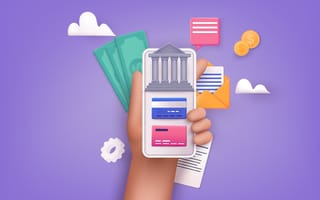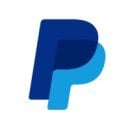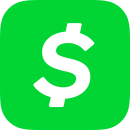Whether it’s sending money, tracking expenses or trading crypto — there’s usually a fintech app for that.
Fintech apps merge banking with the convenience of on-the-go, digital-first lifestyles, delivering financial services through intuitive, user-friendly interfaces accessible via smartphones or other devices. Many integrate emerging technologies like artificial intelligence and machine learning to automate financial planning, creating data-driven investment portfolios and robo-advisors. Others are designed to simplify everyday tasks, such as splitting bills amongst a group of friends or reviewing account balances. Whatever the purpose, fintech apps are a convenient alternative to traditional finance systems, empowering users to take a hands-on approach to money management.
Top Fintech Apps to Know
- PayPal
- Venmo
- Robinhood
- Chime
- Acorns
- MoneyLion
- Coinbase
- Revolut
Types of Fintech Apps
Fintech apps fit into several categories. Each is designed to address different aspects of financial management and bring new, tech-driven solutions to age-old problems. The main types include:
- Mobile banking apps provide users with convenient, on-the-go access to their bank accounts and financial services directly from their smartphones. They allow users to check balances, transfer funds, pay bills, manage investments and talk to customer support.
- Digital payment apps enable users to send, receive and manage payments seamlessly through mobile devices. Integrated with a user’s bank account or card, they are designed to support peer-to-peer transfers, in-store purchases and online payments while offering features like digital wallets, autopay and currency conversion.
- Investment apps provide access to stocks, exchange-traded funds (ETFs), cryptocurrencies and other financial assets. Operating off of real-time market data, they typically feature curated portfolios and automated depositing with low or no commission trading.
- Personal finance apps help users manage their money more effectively by tracking expenses, creating budgets and providing data-driven insights into their spending habits. They are often integrated with a user’s bank account to offer real-time updates and personalized advice to set financial goals, monitor credit scores and plan for the future.
- Cryptocurrency apps facilitate peer-to-peer transactions of blockchain-based digital assets, including coins, tokens and NFTs. They typically allow users to buy, sell and store cryptocurrencies securely, while leveraging blockchain technology to enable decentralized finance, or DeFi.
- Lending apps connect borrowers with lenders directly or provide innovative loan options like peer-to-peer lending, while offering tools for quick identity, income and credit verification.
- Regulatory apps are designed to help businesses comply with regulations efficiently by automating tasks like monitoring transactions, verifying identities and managing risk. They often incorporate emerging tech — like AI and machine learning — to streamline compliance processes, reducing the risk of fraud and errors.
Top Fintech Apps to Know
Chime offers a range of digital banking services to more than 22 million users. Founded in 2012, this neobank app has a range of features, including fee-free checking and savings accounts with no minimum balance requirements, early access to paychecks, credit-building tools and financial literacy resources, as well as banking services provided by partner banks like the Bancorp Bank and Stride Bank. It also provides no-fee Visa debit cards and automatic savings tools to help users manage their finances.
Fintech giant Paypal offers a digital wallet app that enables users to send and receive money around the world to more than 110 different countries. Users can access stored cards and accounts through their PayPal profile on demand, seamlessly conducting online money transfers and comprehensive payment management, with support for multiple global currencies.
Venmo is a peer-to-peer payment app that allows users to send and receive money, split bills and make purchases with authorized merchants. It combines financial transactions with social networking features, enabling users to share and comment on payments with followers. It also offers digital debit and credit cards — including a credit card specialized for teens — and acts as a cryptocurrency management platform.
Betterment is an investment app that aims to simplify wealth-building for individuals, employers and financial advisors. Its features include curated portfolios — including individual, Roth IRA and 401(k) accounts — automated deposits, tax management tools and goal-based financial planning. And if there’s any confusion on what steps to take next, Betterment can virtually connect its users to certified financial advisors for guidance.
Acorns is an investment app that automatically invests users’ spare change from everyday purchases into diversified portfolios of exchange-traded funds, or ETFs. The idea is to round up the total to the nearest dollar whenever a user makes a purchase, such as groceries or a streaming service subscription, and then put away the leftover change for later. The app also offers online banking with no hidden fees, mobile check deposits and access to more than 55,000 fee-free ATMs.
Robinhood is an investment app that offers commission-free trading of stocks, ETFs, options and cryptocurrencies up to 24 hours a day, five days a week. With 23 million users, it is designed to make investing accessible to a broad audience, providing features such as fractional share trading, recurring investments and real-time market data that can be managed from a desktop or mobile device.
Coinbase enables users to buy, sell and manage more than 10,000 cryptocurrencies, including Bitcoin and Ethereum. Users can set up their own self-custody Coinbase wallet to store crypto, tokens, NFTs and even other wallets, and then use it to access decentralized apps, or dApps. Coinbase’s exchange platform also allows users to swap, stake or mint crypto. It also provides access to real-time market data and educational resources, making it accessible for both beginners and experienced crypto traders.
Stash is a personal finance app that combines investing, banking and budgeting tools to help users manage their finances. Its Smart Portfolio feature works like a robo-advisor, automatically adjusting investments to keep the right balance and reinvesting dividends to help grow your money, all based on your risk level. Launched in 2015, the app also offers a debit card that rewards spending with stock, as well as educational content to guide its 1.5 million active subscribers toward financial growth.
Cash App is a digital wallet and peer-to-peer payment app that allows users to send and receive money, invest in stocks, customize your own debit card and buy cryptocurrency. With 57 million users, the popular fintech app also provides access to personal loans and early direct deposit drop — and all without any monthly fees or overdraft charges.
Revolut is a personal finance app that offers a comprehensive suite of services, including multi-currency accounts, international money transfers, cryptocurrency exchange and stock trading. With features like budgeting tools, savings vaults and real-time spending notifications, it lets users manage different aspects of their finances on a single platform.
MoneyLion is a money lending app designed to simplify the process of taking out a loan. With 14 million customers, it connects users to different types of loans, including credit-building loans, personal loans and “Instacash” cash advances, through its financial partners like CitiBank, TransUnion and SoFi. Launched in 2013, MoneyLion also offers access to credit cards, cash advances, credit monitoring and mobile banking.
Upside is a fintech company that offers software to provide cashback rewards to customers after they spend at brick-and-mortar retail locations. This allows retailers to earn more profits without changing how they operate, while consumers gain increased purchasing power.
Block is the parent company responsible for multiple fintech apps, including Afterpay, which is a financial wellness solution that lets consumers set up a plan to pay off their purchases over time. Users can manage their spending and explore brands in the app and earn rewards via in-store and online shopping.
Airwallex provides a unified platform that equips businesses with tools for international payments, foreign exchange and digital banking. Its offerings cover multi-currency business accounts, international transfers, payment processing and expense management. According to the company, it supports local accounts in over 60 countries and enables fund transfers across 150 markets.
NinjaTrader provides a fintech app for those interested in active trading for financial instruments, futures and derivatives beyond stocks. Its platform gives users access to order execution, analytics, advanced charting and real-time market data. The company was founded in 2003 and is based in Chicago.
Circle is a global fintech company that aims to accelerate the adoption of digital currency. While initially known for its consumer wallet app, the company’s core focus is now on providing enterprise-grade financial infrastructure. Circle’s technology allows businesses to seamlessly embed stablecoins like USDC into their apps, platforms and payment flows via a single API, enabling real-time, compliant financial transactions and cross-border commerce.


















